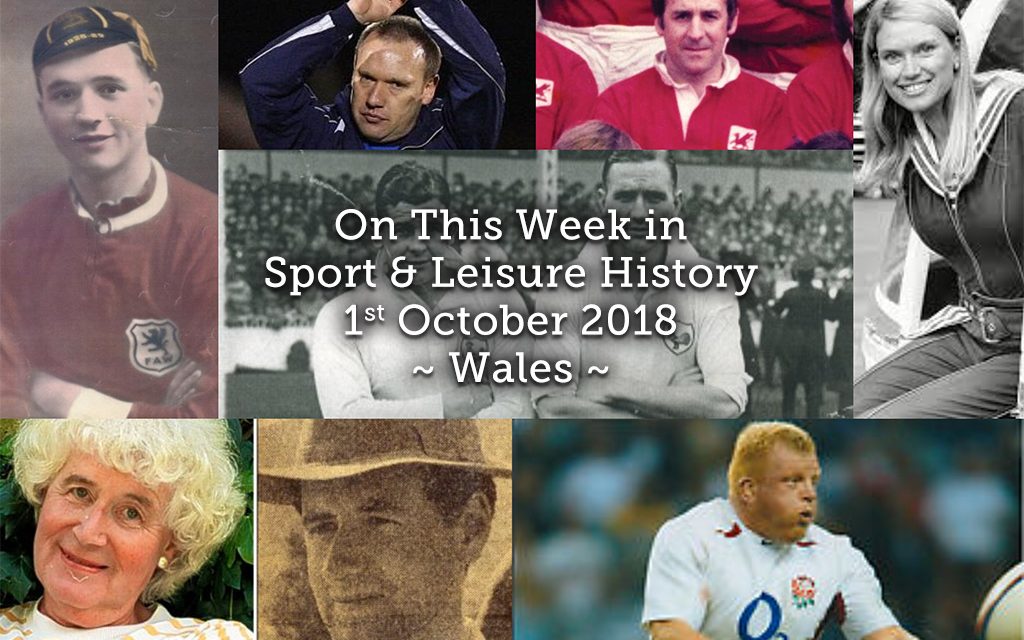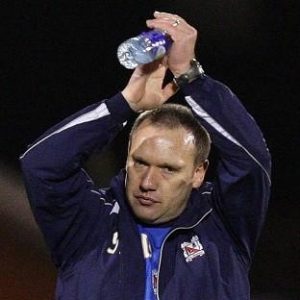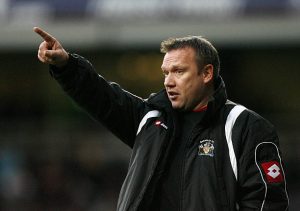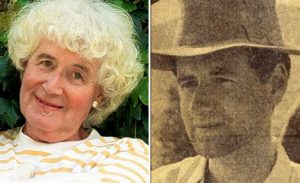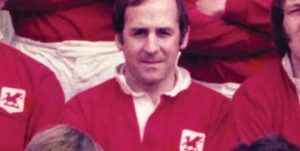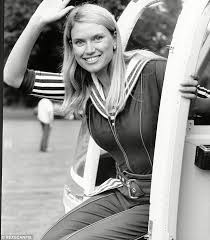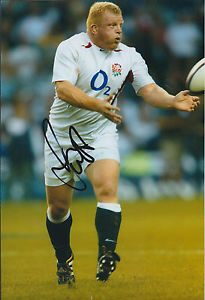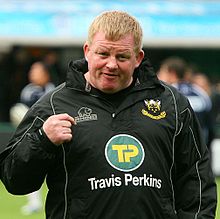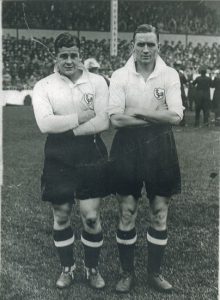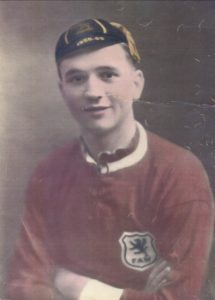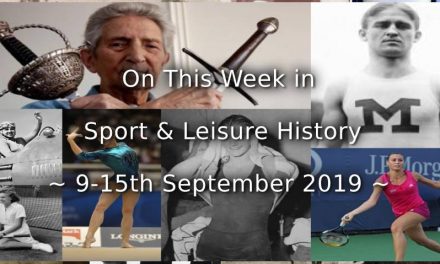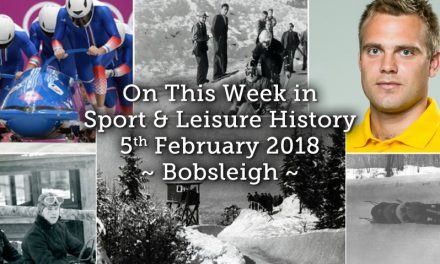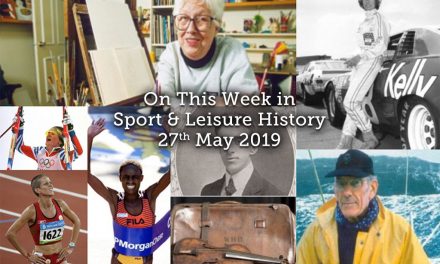On This Week takes a look at some Welsh born sport and leisure personalities, who were born or died during the first 7 days of October in by gone years.
1st
Former Welsh footballer and manager Simon Davey was born in Swansea on this day in 1970. He is now Head Director of a youth club in America called Southern Soccer Academy. He played for Swansea City, Carlisle United and Preston North End and had a short loan spell with Darlington, making a total of 271 appearances in the Football League. After retiring as a player, he spent eight years as a coach at Preston, before going on to manage Barnsley, Darlington and, until October 2010, Hereford United. After retiring, Preston manager David Moyes gave Simon a chance at coaching with the club and within a short time he was in charge of Preston’s Youth Academy, later moving to the Youth Academy at Barnsley. Simon was appointed caretaker manager of Barnsley in November 2006, following Andy Ritchie’s dismissal. After a successful start he was given the job on a permanent basis at the end of the year and later led the club to a successful fight against relegation at the end of the 2006–07 season. He later signed a four-year contract in December 2007 after an impressive start to the following season. Two months later, he led the club to a shock FA Cup win at Liverpool and 3 weeks after that, led them to victory over Chelsea to take the club into the FA Cup semi-finals at Wembley Stadium for the first time in 96 years, before losing to Cardiff City. Simon successfully kept Barnsley in the Championship for 3 consecutive seasons. On Saturday 29 August 2009, Simon’s contract was terminated by mutual consent. On 1st April 2010, Simon was appointed manager of League Two club Darlington, following the dismissal of Steve Staunton. On 1 Darlington chairman Raj Singh issued a statement on the club website informing fans that Simon had quit the club for personal reasons, despite being widely tipped to take over as Hereford United manager. Hereford United confirmed the appointment of Simon as the club’s new manager on a two-year deal on 22 June 2010. In May 2012, Simon began to coach the youngsters for Southern Soccer Academy. The club is a Chelsea Affiliate. It is currently one of the largest soccer clubs in the south, and one of the largest in Georgia. Simon is the Director.
2nd
Historian, journalist and author Jan Morris was born today in 1926. Born of an English mother and Welsh father, Morris was educated at Lancing College, West Sussex, and Christ Church, Oxford, and considers herself Welsh. In what has been referred to as a “jaw-dropping life” – Morris served in the 9th Queen’s Royal Lancers in the closing stages of the Second World War and in 1945 was posted to the Free Territory of Trieste, during the joint British-American occupation. After the war Morris wrote for The Times and accompanied Hillary and Norgay to Everest in 1953, and who secreted news of their success back to London. At the age of 45, in 1972 Morris travelled to Casablanca for gender reassignment surgery. After eventually divorcing Morris and his wife remained together and in May 2008 were legally “reunited” when the entered into a civil partnership. Jan has received honorary doctorates from the University of Wales and the University of Glamorgan, is an honorary fellow of Christ Church, Oxford, and is a fellow of the Royal Society of Literature. She received the Glyndŵr Award for Outstanding Contribution to the Arts in Wales in 1996. She accepted her CBE in the 1999 Queen’s Birthday Honours “out of polite respect”, but is a Welsh nationalist republican at heart In January 2008, The Times named her the 15th greatest British writer since the War and she has featured in the Pinc List of leading Welsh LGBT figures. She won the 2018 Edward Stanford Outstanding Contribution to Travel Writing Award. In an interview with BBC in 2016 she told Michael Palin that she does not like to be described as a travel writer, as her books are not about movement and journeys; they are about places and people.
- Jan as she is today and in her previous life as James
3rd
William Gwyn Hullin, Welsh international rugby union player died on this day in 2012. Born on 2nd January 1942 in the town of Loughor, in Swansea, He played rugby as a boy, representing his school Dynevor Grammar, and progressed to play for the Wales Secondary Schools team. As a senior Billy played for Mumbles before switching to Aberavon, where he was part of the team that helped the club win the unofficial Western Mail Championship for the only time. He spent a brief season at Swansea RFC before being selected by Welsh rivals Cardiff in the 1963/64 season. By the following season he was a first team regular, playing in 33 matches and scoring 12 tries His most notable game was for Cardiff occurred on 5th November 1966 when he was part of the team that faced John Thornett’s touring Australian team. Cardiff won the match 14 – 8 and Billy was influential throughout, scoring the match-winner after out-smarting his opposite number Ken Catchpole, scoring a try and a drop goal. The 1966/67 season also saw Billy break into the Wales squad when he was selected for the Welsh opener of the 1967 Five Nations Championship, played away against Scotland. He was paired at half-back, with his Cardiff teammate and fellow international debutant, Barry John. Despite some excellent players in the team, the Welsh play was unimaginative, often negative, and they lost 11-5, he was dropped the next game and never represented Wales again. Billy continued to represent Cardiff and was also given his first invite to represent invitational tourists, the Barbarians, that same season. He left Cardiff at the end of the 1968/69 season, after a total of 152 appearances over 6 seasons[ scoring 43 tries. At the age of 28, his career in banking had taken him to London, and there he was welcomed into Welsh exiles team, London Welsh. Described as a fine strategist, he spent seven years at the club. In 1972 he was part of the London Welsh team to undertake their first overseas tour, to Ceylon. The team, containing several Welsh internationals, played six matches, winning them all. Billy was also a regular Sevens player for Cardiff and represented them in 10 tournaments. On 10th May 1975 he was captain of the Welsh Presidents in the Ulster Invitation Centenary Sevens at Ravenhill in Belfast.
4th
Anne Lucinda Hartley Rice, known professionally as Anneka Rice was born on this day in 1958 in Cowbridge, Glamorgan. She adopted the name “Anneka” when she joined the British actors’ union Equity, as her birth-name had already been registered. She began her broadcasting career as a trainee for the BBC World Service and at 19 she moved to Hong Kong, where she presented the news on English language television station TVB Pearl. Upon returning to the UK three years later, she worked as a secretary in the BBC Children’s department. In 1982 she landed her first major TV job as the jump-suited skyrunner” of Channel 4’s Treasure Hunt, which was hosted by former BBC newsman Kenneth Kendall. The show proved one of Channel 4’s most popular programmes and was nominated for a BAFTA in 1986, in the category “Best Light Entertainment Programme”. She hosted the BBC’s Children in Need appeal in 1987 and tested an early version of her next project, Challenge Anneka. Which had been devised by herself and was launched in 1989 on BBC 1. It ran for a further five years. She has written books on skiing and scuba diving presently she is presents on BBC radio. When Outspan agreed to sponsor the England Cricket Team ahead of their campaign in the 1999 Cricket World Cup, she was picked as a celebrity to launch the partnership, although she admitted that she found cricket as boring as fishing.
5th
Dorian Edward West, was born in Wrexham on this day in 1967. Hiis family moved to England when he was young. Before professionalism in his sport of rugby union, he was a police officer with the Leicestershire Constabulary’s armed response unit. He made his debut at Leicester Tigers and played for them as a flanker but a move to Nottingham in 1991 saw him convert to hooker. He rejected the offer of a trial for Wales. He moved back to Leicester in 1996 where he became an understudy to Richard Cockerill. His form improved and he was noticed by England coach Clive Woodward during matches when Cockerill was away on international duty. This resulted in him being picked on the England bench for the 1998 match against France, coming on to replace Cockerill. The next week Cockerill was injured, but second-choice Mark Regan who had been injured for the match against France was fit again, so West was again selected on the bench, and came onto win his second cap.. He played in the 2001 Six Nations, and was selected for the England tour to Canada and the USA, where he added 3 caps. After the end of the tour he was called up whilst on holiday as a replacement for the British & Irish Lions and performed so well he was on the bench for the final two tests. He failed to keep his shirt to Northampton Saints’ hooker Steve Thompson, but was a useful squad member. At Leicester West enjoyed great domestic success, and started both the 2001 and 2002 Heineken Cup finals.He announced his retirement from international rugby after the end of the 2003 World Cup and turned to coaching becoming forward coach for the England U21s. On 8th June 2007 he signed as forwards coach to recently relegated Northampton Saints alongside former England Saxons head coach, Jim Mallinder, but in March 2018 it was announced that he would be leaving the club by mutual consent at the end of the 2017/18 season.
6th
On this day in 1906, the Welsh professional footballer Eugene “Taffy” O’Callaghan was born in Ebbw Vale. He played for his local side whilst working in the coal mines and was invited to join the ground-staff from where he joined Tottenham, making his debut for the first team against Everton, having impressed with his two-footed play and accurate passing. Again, in 1928, he impressed against Everton, scoring four goals in February of that year. Taffy helped the team achieve promotion back to Football League First Division at the end of the 1932–33 season and in the following year was a key member of the side known as the ‘greyhounds’ as they played with speed and style. During his time at Spurs he made 252 league appearances scoring 93 goals and a further six in eleven FA Cup matches for the club. He was transferred to Leicester City in March 1935 although playing once again for Tottenham as a ’guest’ during the war years at the time when the Football League had been suspended. After the war he went on to a coaching role at Fulham. He won his first cap for Wales in May 1929 and went on to play a further 11 times for his country. He died on 4th July 1946.
- Standing beside Willie Evans

